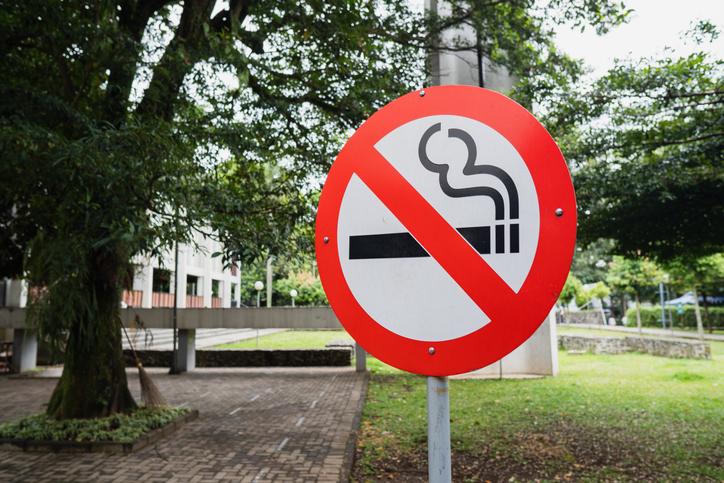Tobacco is responsible for the deaths of more than 8 million people in the world every year, with 1.3 million of those down to passive smoking. Non-smokers are suffering with serious diseases and can even die because of the cigarettes smoked by others. A modern, forward-thinking institution needs a comprehensive programme to work towards a tobacco-free campus.
Here, I’ll outline the studies and actions we carried out at the Faculty of Medicine on tobacco control, and the effects they had on our campus.
Tobacco control training
According to our evidence-based knowledge, the leading way to reduce the prevalence of tobacco consumption in college students is through a comprehensive tobacco control education programme. Based on our observations that tobacco addiction is high among university students in northern Cyprus, as in many countries where tobacco use is widespread, we implemented a tobacco control training programme for medical students in 2015.
Within this framework, we organised two-hour-long conference-style training sessions on the health risks and economic effects of tobacco use, and the role of physicians and healthcare professionals in tobacco control, which later became a six-hour-long training session, integrated into the third-year curriculum for medical students. This training covered the importance of legal measures, tobacco control laws and international measures, and focused on reviewing and examining the international efforts to combat tobacco use and its consequences.
- How supported social groups create safe spaces
- Students learn better on caring campuses – here’s how to create one
- Student support takes a village – but you need to create one first
We also incorporated a three-day-long training programme with the active participation of the interns in their sixth phase (year). During the programme, they took part in skill-building practices to assist their patients to quit smoking and gained experience in performing their role, as future healthcare professionals, in tobacco control. They also explored the topic by researching available resources and preparing their own presentations to discuss various angles on the harms of tobacco and tobacco control.
Having observed this process, I believe interactive and research-based programmes geared towards assisting students to explore the economic and commercial aspects of tobacco production, and its use in relation to its health and environmental consequences, can be integrated into the curricula of any faculty.
How students took the baton
At the end of the 2017 academic year, we planned a multifaceted tobacco control project, to be implemented between 2018 and 2022. First, we conducted baseline surveys that demonstrated that tobacco use among medical students was rather high – 42 per cent among male students, 26 per cent among female students and 34 per cent overall. Having identified the students and faculty members who were smokers, we carried out evidence-based interventions such as training, raising awareness of research results of relevant studies, smoking cessation assistance and monitoring.
Although we couldn’t implement the intervention and post-intervention evaluation phases of the project due to the conditions of the Covid-19 pandemic, we encouraged the students who had received the training to set up a Tobacco Control Club when lockdown restrictions had eased, to spread our efforts towards a tobacco-free campus throughout the university.
The club, run by the students, was promoted widely. Activities started with organising in-club training sessions with students and staff to combat the cultural practice of smoking in closed environments. Despite the law, this is widespread in northern Cyprus. As a result of the club’s actions, we were able to set up smoke-free areas around campus buildings.
The club’s first mass event was the symposium titled “Tobacco control symposium – towards a tobacco-free campus”, which addressed all aspects of tobacco addiction and control, and was held open to the public in March 2024. The two-day symposium, organised and presented by club members with the support of the Faculty of Medicine, covered the causes of tobacco consumption, its consequences, methods of combating it, smoking cessation practices, the goal of a tobacco-free campus and the action plan for this goal. At the end of the symposium, the participants fed back positively.
The Tobacco Control Club continues its activities and creates new action programmes, with a significant number of new members joining since the beginning of this academic year. In addition to the events held, especially the symposium, and the face-to-face interaction of active members, the club’s internet page also had an impact on the increase in the number of student members from different faculties. The number of students who reported that they quit smoking during or as a result of these trainings and activities shows that our efforts were not in vain.
Tobacco-free campus strategy requires sincere support and active participation of administrators, students, faculty members and all employees. Tobacco control and the goal of a tobacco-free campus are vital to protecting young people in education from a deadly habit.
Beyond this, it’s important for these studies to be disseminated to society as a whole. E-cigarettes and vaping have not improved quitting rates in northern Cyprus, as many smokers vape alongside their traditional cigarettes. For this reason, academics have a responsibility to make their research heard when it comes to legal and administrative measures on tobacco control in all public areas.
Create and support student clubs to ensure student participation. In addition to all the practices I mentioned in this article, banning cigarette sales in educational institutions is a proven method in preventing students from taking up smoking and helping them to quit.
The journey towards a tobacco-free campus will not only improve individual and collective health, but will also contribute to a cleaner, safer and more sustainable educational environment for all.
Özen Aşut is a professor in the department of public health, Faculty of Medicine at Near East University.
If you would like advice and insight from academics and university staff delivered direct to your inbox each week, sign up for the Campus newsletter.




comment